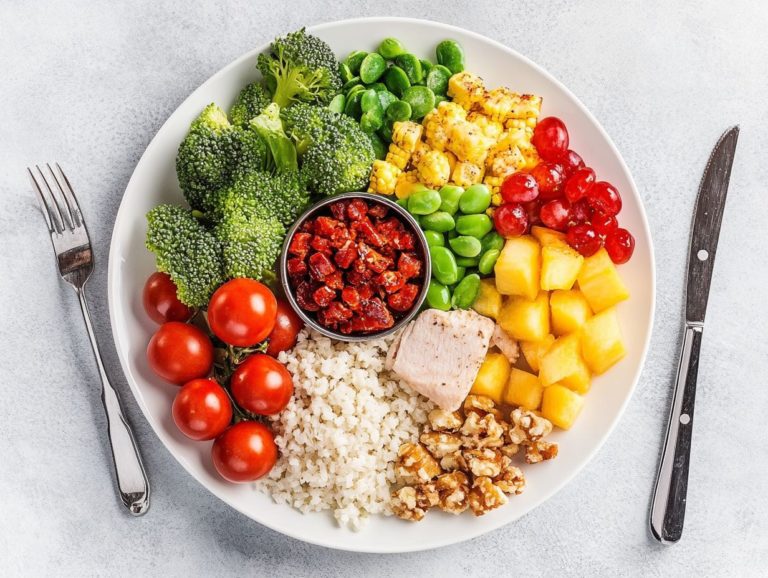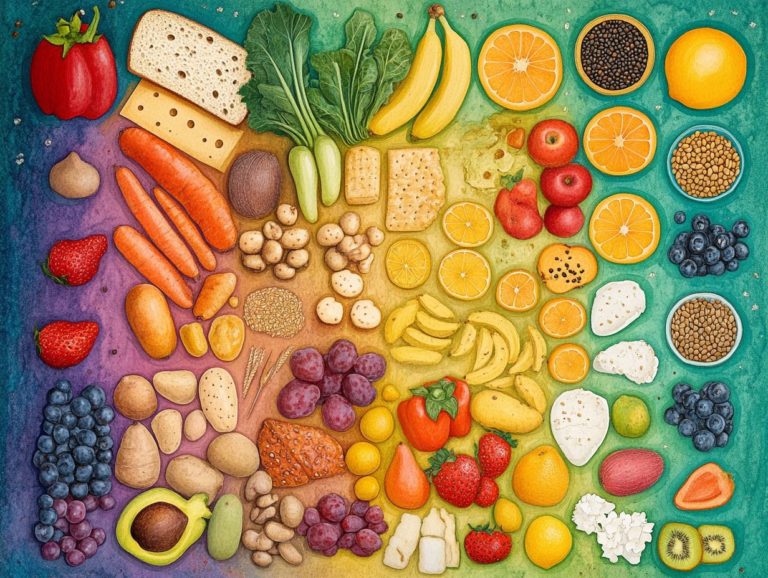Navigating Dietary Guidelines as a Vegetarian
Embracing a vegetarian diet is not just a choice; it s a fulfilling and health-conscious journey that brings a wealth of benefits for both your body and the planet.
This article delves into the world of vegetarianism, highlighting its health and environmental advantages. It also guides you through dietary guidelines to ensure you re receiving all the essential nutrients your body craves.
You will find practical tips for meal planning and insights into common challenges faced by vegetarians. Effective strategies for maintaining a balanced diet will also be covered.
Step into this exploration and discover the vibrant lifestyle that vegetarianism has to offer!
Contents
- Key Takeaways:
- Benefits of a Vegetarian Diet
- Understanding Dietary Guidelines for Vegetarians
- Making Nutritious Vegetarian Choices
- Challenges and Solutions for Vegetarianism
- Tips for a Balanced Vegetarian Diet
- Frequently Asked Questions about Vegetarian Diets
- What are the main challenges of following dietary guidelines as a vegetarian?
- Should vegetarians follow the same dietary guidelines as non-vegetarians?
- Can vegetarians get all the necessary nutrients from a plant-based diet?
- How can I ensure adequate protein intake as a vegetarian?
- Are there specific dietary guidelines for vegans?
- Are there potential health benefits to following a vegetarian diet?
Key Takeaways:

A balanced vegetarian diet can provide numerous health and environmental benefits.
Understanding dietary guidelines for vegetarians can help prevent nutrient deficiencies and improve overall health.
To navigate dietary guidelines successfully as a vegetarian, incorporate a variety of nutritious foods, plan meals ahead, and find substitutes for non-vegetarian options.
What is a Vegetarian Diet?
A vegetarian diet excludes meat while embracing a diverse array of plant-based foods and dairy products. It offers a wealth of nutritious options for anyone looking to adopt healthier eating habits.
This exciting diet focuses on fruits, vegetables, whole grains, pulses, legumes, nuts, and seeds. This ensures you receive essential nutrients while maintaining a balanced approach that meets your dietary requirements.
Within this framework, you can explore variations like lacto-vegetarianism, which includes dairy, and ovo-vegetarianism, which incorporates eggs. These variations give you even more flexibility in your choices.
If you opt for a vegan lifestyle, you ll eliminate all animal products. This encourages a greater focus on plant-based alternatives like tofu and tempeh, both of which are excellent sources of protein.
Embracing vegetarianism encourages you to make healthier choices. It promotes food balance by integrating diverse ingredients that are rich in vitamins and minerals.
This adaptable diet fosters your overall well-being and enhances your awareness of sustainable eating practices. It is a commendable option for health-conscious individuals and those with a keen interest in environmental responsibility.
Benefits of a Vegetarian Diet
Adopting a vegetarian diet can provide you with numerous health benefits. You may find a reduced risk of chronic diseases like heart disease, diabetes, and certain cancers.
This way of eating encourages a balanced approach to nutrition. It emphasizes essential food groups that are abundant in vitamins, minerals, and dietary fiber.
Health and Environmental Benefits
The health benefits of a vegetarian diet go beyond personal well-being; they also promote environmental sustainability. This is achieved by reducing carbon footprints and conserving the water resources typically consumed in meat production.
Research shows that embracing a plant-based diet aids in weight management and supplies essential nutrients that enhance overall health.
This diet is abundant in unsaturated fats and omega-3 fatty acids, both vital for improved cardiovascular health and lower cholesterol levels.
By prioritizing whole grains, legumes, fruits, and vegetables, you can significantly decrease your risk of heart disease and cognitive decline.
A vegetarian lifestyle can help you avoid nutrient deficiencies often linked to high meat consumption. This includes nutrients like vitamin B12 and iron by encouraging the intake of foods that have vitamins or minerals added to them and plant-based alternatives.
A plant-centered diet can enhance your health and benefit the environment.
Understanding Dietary Guidelines for Vegetarians

Understanding dietary guidelines for vegetarians is essential for meeting your nutritional requirements while embracing a plant-based diet. It’s important to incorporate a variety of food groups to prevent nutrient deficiencies.
These guidelines act as a roadmap. They guide you toward a balanced diet that is rich in vitamins, minerals, and protein sources vital for your overall health.
Embrace a vegetarian lifestyle today for a healthier you and a happier planet!
Nutrients to Focus on and Potential Deficiencies
Key nutrients you should focus on as a vegetarian include iron, vitamin B12, calcium, and omega-3 fatty acids. These nutrients are often found in meat and dairy, putting you at risk of deficiencies.
To balance out this, incorporating a variety of food sources and fortified options can help ensure you maintain a balanced intake of essential nutrients.
To enhance your overall health, make plant-based protein sources like legumes, lentils, and quinoa a priority in your meal planning. Fortified cereals can effectively replenish your vitamin B12 levels, while leafy greens and nuts are excellent sources of calcium.
In terms of omega-3 fatty acids, which are healthy fats that support heart health, consider options like flaxseeds, chia seeds, and walnuts to support your heart health.
Use cooking methods like steaming or saut ing to keep nutrients intact, promoting healthier choices across all your meals. By adopting these strategies, you can maintain nutritional balance and significantly minimize the risk of dietary shortfalls.
Making Nutritious Vegetarian Choices
Making nutritious vegetarian choices requires you to explore the wide array of options available and select foods that not only meet your dietary needs but also provide essential nutrients. This ensures that your meals are both satisfying and healthy.
By prioritizing whole foods and incorporating diverse food groups, you can craft balanced vegetarian meals that are bursting with flavor and nutrition.
Meal Planning and Substitutes
Effective meal planning is crucial for you as a vegetarian, ensuring you get a balanced intake of nutrients while discovering suitable food substitutes that elevate both the variety and enjoyment of your meals. By intentionally incorporating various cooking methods and diverse ingredients, you can whip up delicious vegetarian dishes that satisfy your dietary needs.
Craft your weekly menu today to simplify your cooking and reduce waste! Creating a grocery shopping list based on your planned meals ensures it includes a vibrant mix of fresh vegetables, whole grains, and fiber-rich options.
Preparing meals in advance not only saves you precious time during hectic weekdays but also encourages you to experiment with new recipes that replace traditional animal products. For instance, legumes make fantastic protein sources and can easily step in for meat, while plant-based alternatives to dairy, like almond milk or cashew cheese, provide creamy textures without skimping on flavor.
These strategic choices help you maintain meal variety without sacrificing nutrition.
Challenges and Solutions for Vegetarianism

Vegetarianism can indeed present its fair share of challenges, particularly in social settings, where you might encounter limited food options or face misunderstandings regarding your dietary preferences.
Find solutions that fit your lifestyle and health goals. By proactively addressing these challenges, you can uphold your commitment to a healthy diet while ensuring that your social interactions remain enjoyable and your nutritional balance intact.
Addressing Social and Practical Challenges
Addressing the social and practical challenges that vegetarians face is essential for creating an environment that nurtures healthy eating choices and lifestyle commitment. By honing effective communication, meticulous planning, and a touch of resourcefulness, you can effortlessly navigate social situations while staying true to your vegetarian diet.
Take the initiative to organize potlucks; they offer a wonderful opportunity to showcase and share delectable vegetarian dishes. This lets everyone enjoy a mix of flavors and fosters a sense of inclusivity among all attendees.
- Sharing recipes with friends strengthens community ties and offers invaluable meal prep tips.
When dining out, it s wise to research restaurants ahead of time, ensuring you find options that cater to your dietary preferences. Don t shy away from making requests regarding portion control, as this can help you manage your energy intake and keep temptation at bay.
Similarly, when traveling, consider packing snacks or researching local markets; both can lead to delightful discoveries and guarantee access to wholesome vegetarian options wherever you go.
Tips for a Balanced Vegetarian Diet
Maintaining a balanced vegetarian diet requires thoughtful choices in food selection and preparation. It s about ensuring that your meals are packed with nutrients and are delightful and satisfying.
Embrace a diverse array of foods and emphasize balance to attain optimal health and wellness through your dietary choices.
Incorporating Variety and Adequate Nutrition
Incorporate variety and adequate nutrition into your vegetarian meals to craft a well-rounded diet that fulfills all your dietary needs while delivering rich flavors and textures. Achieve this by strategically selecting diverse ingredients and employing various cooking methods, ensuring your meals are appealing and nourishing.
Explore a range of protein sources like legumes, nuts, and quinoa, alongside starchy carbohydrates such as whole grains and root vegetables to create delightfully balanced dishes.
Utilize versatile cooking techniques like grilling, steaming, and stir-frying to enhance both the flavor and nutritional profile of your meals.
Vitamins and minerals are vital to your overall health. A colorful assortment of fruits and vegetables helps provide the essential nutrients you need. This colorful approach makes your meals exciting and nutritious!
Frequently Asked Questions about Vegetarian Diets

What are the main challenges of following dietary guidelines as a vegetarian?
One of the main challenges is ensuring an adequate intake of essential nutrients, especially proteins, iron, and B vitamins, as many plant-based foods do not contain them in high amounts.
Should vegetarians follow the same dietary guidelines as non-vegetarians?
While general dietary guidelines apply to everyone, there are specific recommendations for a vegetarian diet, such as consuming a variety of plant-based foods to meet nutritional needs.
Can vegetarians get all the necessary nutrients from a plant-based diet?
Yes! With proper planning and attention to food choices, vegetarians can meet their nutritional needs without consuming animal products. It s important to include a variety of whole grains, legumes, nuts, seeds, fruits, and vegetables in your diet.
How can I ensure adequate protein intake as a vegetarian?
Vegetarians can obtain enough protein by including a variety of plant-based protein sources such as beans, lentils, tofu, tempeh, nuts, seeds, and whole grains in their diet. Eating a combination of these foods throughout the day can provide all the essential amino acids, which are the building blocks of protein.
Are there specific dietary guidelines for vegans?
Yes! In addition to following general dietary guidelines, vegans should pay attention to getting enough calcium, vitamin D, and vitamin B12 from fortified foods or supplements, as these nutrients are primarily found in animal products.
Are there potential health benefits to following a vegetarian diet?
Research shows that a well-planned vegetarian diet can dramatically lower your risk of heart disease, diabetes, and some types of cancer. It can also lead to a lower intake of saturated fats and cholesterol while increasing fiber, vitamins, and minerals.
Start your journey to a healthier you with delicious vegetarian meals today!






